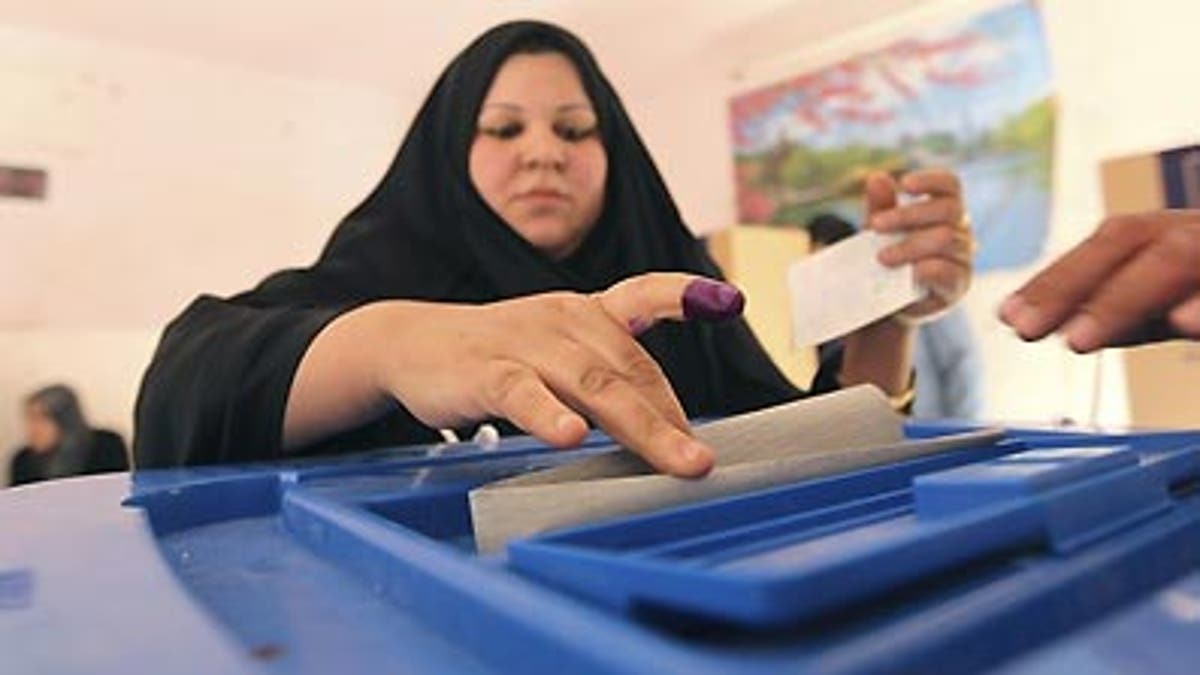
Reuters
Iraq took another major stride Sunday in the elections it held. But the potential benefits to the U.S. from progress there is being squandered by the Obama administration, which remains wedded to a policy of forced estrangement. Rather than engage in vigorous diplomacy to create a partnership with Iraq that could alter the region dramatically for the better, team Obama seems focused instead on having as little to do with Iraq as possible. It still sees Iraq only through the lens of domestic politics, as it did in the 2008 presidential election. Even some Democrats on Capitol Hill are beginning to worry.
Despite progress in Iraq, the country and broader region still pose serious challenges to U.S. interests—but they also present opportunities. Sunday’s elections attracted the participation of Iraq’s three main ethnic groups, which is itself a victory. However, the formation of a government in the wake of elections may not be smooth. More broadly, the nature of the country’s national and local governments will continue to change from the flawed polity bequeathed to Baghdad as the U.S. occupation ended. Iraq will be tumultuous for some time to come. But there is a tremendous opportunity for the U.S. in partnering with a country whose geography, history and economic resources can make it a major force in the region. As the only true republic in any Arab-majority state, Iraq should be our key partner in the region.
Unfortunately the Obama White House has been asleep at the wheel. Recently, this has meant the U.S. played little role in the lead-up to the Iraqi election. In Baghdad, important political leaders have complained about an inability to access U.S. ambassador Christopher Hill, who has developed the reputation of being aloof and lazy. Worse, senior Iraqis do not know whom to call when an urgent matter needs a fair hearing at the highest levels of the White House. Previous U.S. ambassadors filled this role, but that is no longer the case. Beyond generalities, like statements supporting plural democracy, the Obama administration lacks a the vision or will to shape developments in Iraq and the region.
This is a shame, given high stakes and our adversaries’ attention to Iraq. The hostile regime next door in Iran is seeking to fill any vacuum left by U.S. military and political disengagement from Iraq. General Odierno, the U.S. commander, remarked last month that “We still uncover Iranian rockets and other goods that are made, and individuals that are trained, in Iran to conduct attacks against both U.S. and Iraqi security forces.” Odierno was equally clear about Iraqi politicians who are doing Iran’s bidding in the country. The objective they seek is a government that would be profoundly hostile to America. One can start to imagine the nightmare of an Iranian-dominated empire stretching from western Afghanistan through Iraq and all the way to the edge of the Mediterranean.
Potentially standing athwart that risk is a vigorous Iraqi democracy growing in wealth, power and influence. In fact, Iraq can be our most valuable asset in the region—a hopeful alternative to the Islamist tyranny being advanced by the Iranian regime. But this scenario is made less likely by Mr. Obama’s unilateralist urge to withdraw and his resistance to real diplomacy.
Even Democrats in Congress are concerned at the Obama administration’s detachment. Last week, Senator John Kerry (D-Mass.) sponsored a bipartisan Senate resolution calling on the administration to devote senior-level attention to Iraq. On February 3, twenty-one liberal congressmen wrote to Mr. Obama urging attention to the elections and political developments in Iraq.
When Iraq’s new government is formed in the wake of yesterday’s elections, Mr. Obama should meet the Iraqi prime minister as an equal and begin to work out a long-term security and political cooperation apparatus. This was called for in the Strategic Framework Agreement that entered into force in January 2009. To be successful, this has to go much farther than blithe press statements and photo ops that have been the hallmark of most of Mr. Obama’s diplomacy. The goal should be a comprehensive economic, political and military partnership.
Realistically, this has to include permanent U.S. military bases in Iraq. While all U.S. forces are scheduled to depart by the end of next year, this ought to be surmounted in the interest of both countries. As they have been after wars in Asia and Western Europe, permanent U.S. bases demonstrate more than words ever can our long-term commitment to security in a region. They also foment broad economic and political relationships through which diplomacy can work effectively. But to get there, Mr. Obama will have to develop a serious vision for how the U.S. will maintain its presence in the region. He will have to engage in real diplomacy. It is time for the administration that ran for office on the virtues of diplomacy to try some.
Christian Whiton was a State Department official in the George W. Bush administration from 2003-2009. He is a principal at D.C. Asia Advisory and president of the Hamilton Foundation.
Fox Forum is on Twitter. Follow us @fxnopinion.








































